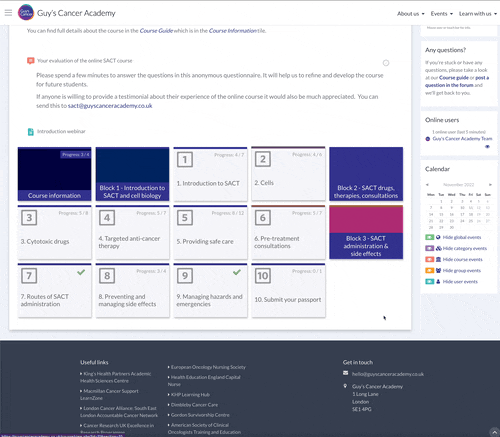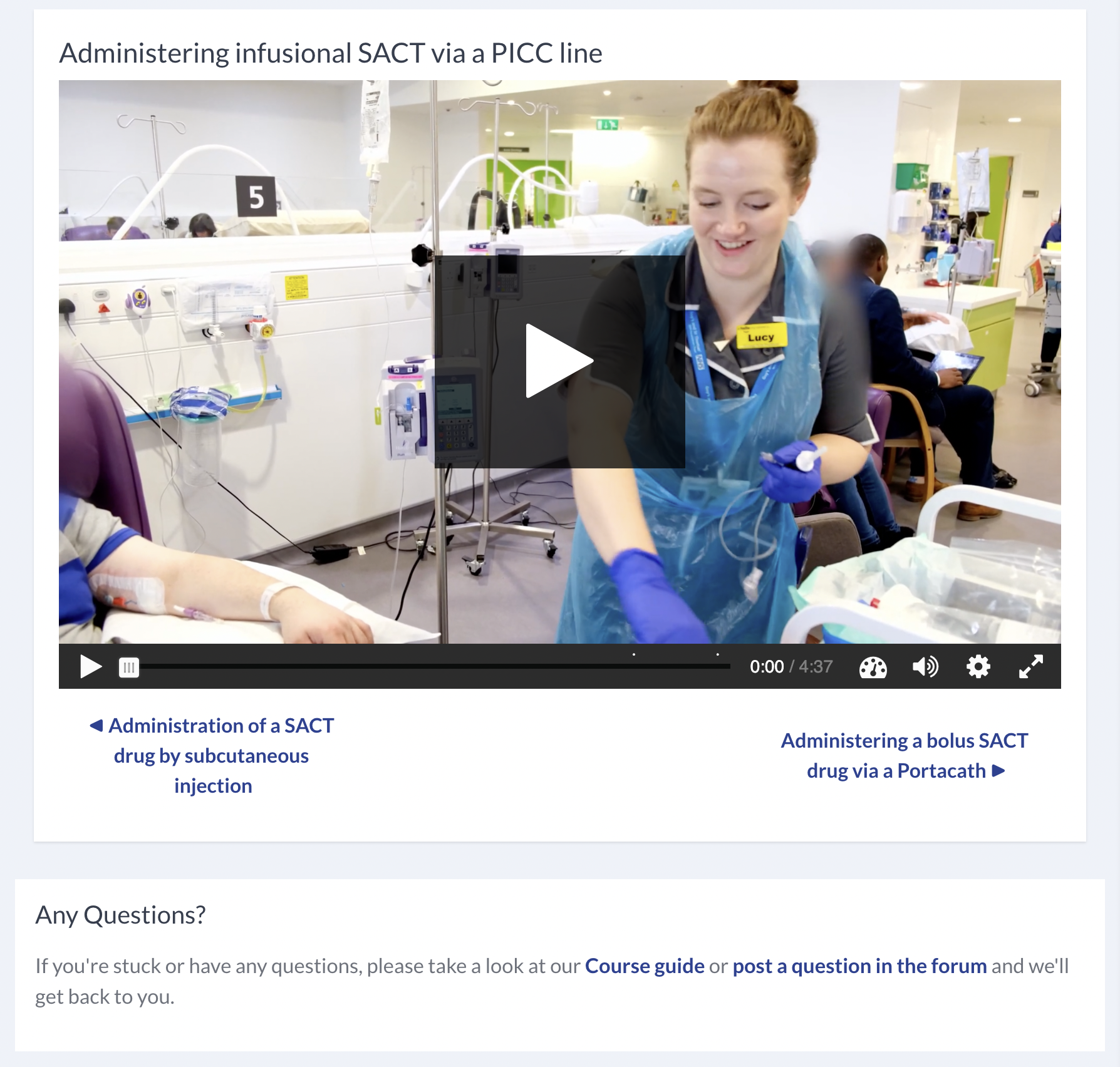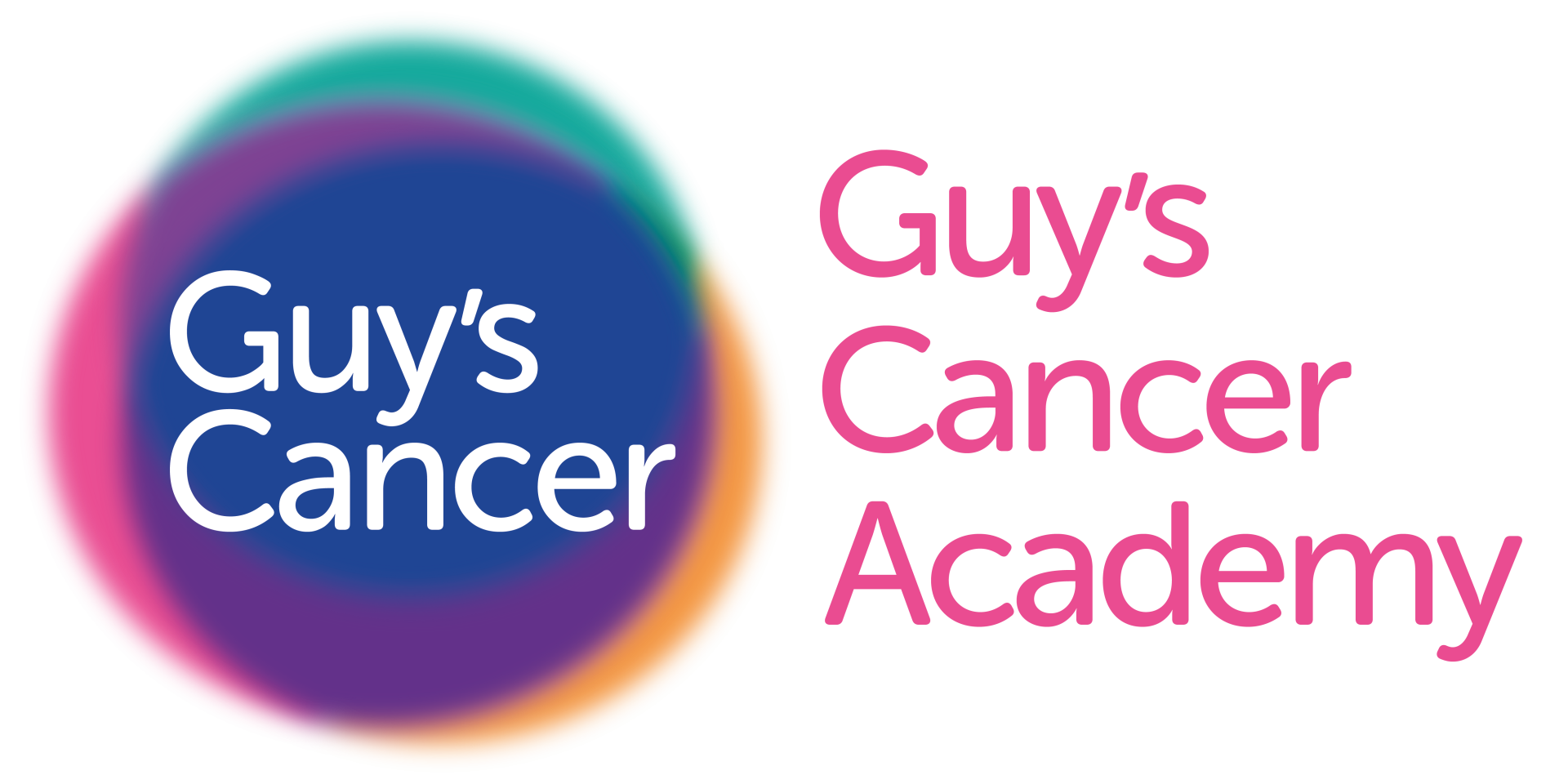Systemic anti-cancer therapy administration and patient care

What you'll learn
Key information
Joint course leads
Dr Catherine Oakley
Dr Catherine Oakley is a Chemotherapy Nurse Consultant at Guy’s Cancer Centre.
Catherine advocates holistic chemotherapy nursing. She is a clinical academic with a research focus on communicating risk and symptom reporting.
Her co-developed award-winning patient diary improves adherence in self-medicating oral chemotherapy and reporting serious symptoms. Her NIHR-funded PhD explored why patients’ delay presenting with neutropenic sepsis.
Catherine is a past president of the UK Oncology Nursing Society (UKONS) and past co-chair of the UK SACT Board. She worked with Cancer Research UK to develop a national cancer patient treatment record and patient film, and is the lead author for the national UKONS SACT nursing Competency Passport.
Catherine advocates holistic chemotherapy nursing. She is a clinical academic with a research focus on communicating risk and symptom reporting.
Her co-developed award-winning patient diary improves adherence in self-medicating oral chemotherapy and reporting serious symptoms. Her NIHR-funded PhD explored why patients’ delay presenting with neutropenic sepsis.
Catherine is a past president of the UK Oncology Nursing Society (UKONS) and past co-chair of the UK SACT Board. She worked with Cancer Research UK to develop a national cancer patient treatment record and patient film, and is the lead author for the national UKONS SACT nursing Competency Passport.
Write your awesome label here.
Lisa McGarry
Lisa McGarry is the Head of Nursing for Oncology at Guy’s and St Thomas’.
She is a highly accomplished, well respected senior nursing leader with over 17 years’ nursing experience in NHS cancer nursing.
She is a highly accomplished, well respected senior nursing leader with over 17 years’ nursing experience in NHS cancer nursing.
Lisa’s extensive nursing experience spans different cancer services including
oncology, haematology and ambulatory systemic anti-cancer therapies (SACT).
Lisa’s portfolio reflects a solid clinical, operational and strategic nursing background in SACT nursing. She has contributed to articles on improving and promoting patient care, support seminars and education modules on SACT, and is a UK Oncology Nursing Society (UKONS) Champion.
Lisa’s portfolio reflects a solid clinical, operational and strategic nursing background in SACT nursing. She has contributed to articles on improving and promoting patient care, support seminars and education modules on SACT, and is a UK Oncology Nursing Society (UKONS) Champion.
Write your awesome label here.
Course tutor
Llywelyn Cadman-Davies
Llywelyn is a Highly Specialist Haematology Pharmacist, specialising in myeloproliferative neoplasms, chronic leukaemia, non-malignant haematology, and thrombosis. He is an Independent Prescriber in medical oncology, colorectal, and hepatobiliary tumours.
Llywelyn is a Guest Lecturer in Cancer Therapeutics at King’s College London and University College London, teaching Cancer Therapeutics, Pharmacology, and Pharmacokinetics.
Llywelyn is a Guest Lecturer in Cancer Therapeutics at King’s College London and University College London, teaching Cancer Therapeutics, Pharmacology, and Pharmacokinetics.
Write your awesome label here.
Write your awesome label here.
Ready to apply?
Watch. Read. Discuss. Interact. Improve.
Bite-sized interactive video lectures
Short, sharp videos with animations, graphics and exercises to explain key concepts clearly
Case studies and interviews
We bring topics to life with interactive case studies and interviews with experts in their field.


Live classes and tutorials
This course features three live sessions to provide a space ask questions and work on activities together.
Feedback and support
Our course team provides tailored feedback on all of your assignments and contributions
What learners on this course say
'This is the best online learning course I have undertaken. There has never been a dull moment watching and listening to the videos and doing the interactive activities.'
'The course is really informative and interactive. Considering we worry about the feeling of ‘missing out’ on being in the classroom setting, I feel I am still getting an excellent quality of information and in different learning styles.'
‘The course was great and gave me a better understanding of what I do. I wish I had done this kind of course when I started my job four years ago.’
Frequently asked questions
How much does the SACT course cost, and what is included in the cost?
Student fees are £1,300 and included within these fees are:
- access to our online platform and course tutors
- all required materials,
- an electronic SACT passport (and a hard copy if requested)
- review and external marking of the SACT passport
- accreditation
Is a Purchase Order number necessary?
To guarantee a place on any of our courses, the submitted application form will need to be accompanied by a valid PO Number.
If a valid Purchase Order Number is not received within one month before the course starts, we will defer your enrolment until the next cohort or until we have received a PO Number.
Self-funding applicants do not need to submit a Purchase Order Number, but the raised invoice will need to be paid before the commencement of the course.
Is there an additional fee for accreditation?
No, fees include all components of your learning.
How much time do I need?
It takes 300 hours to complete the 16-week online course. This comprises:
- 8 hours of live learning events.
- 8 hours of live learning events.
- 170 hours private study.
- 120 hours assessment prep.
- 2 hours course support.
There was some information missing in my application form. Does this matter?
A submitted incomplete application form will need to have all information completed in order to secure a place on any of our courses.
Our Course Administrator will be in touch to advise if any information is missing.
Our Course Administrator will be in touch to advise if any information is missing.
Ready to apply?
The course runs for 16 weeks.
